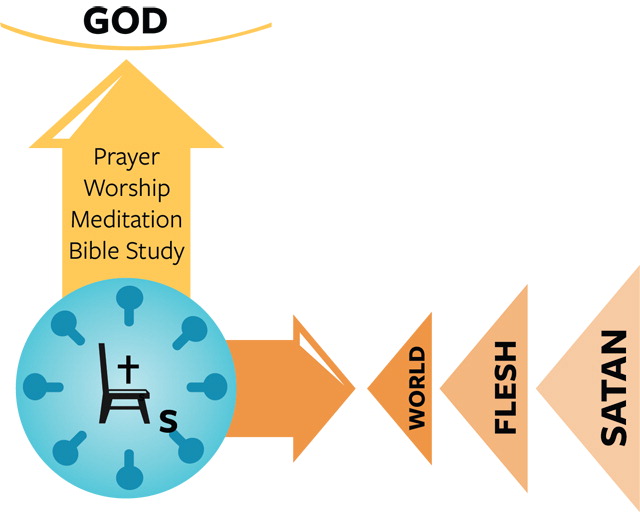Step 4: The Christian and Prayer
The Purpose of Prayer
Jesus set the perfect example of obedience in prayer. Although His day was filled from morning to night with many pressures and responsibilities — addressing crowds, healing the sick, granting private interviews, traveling, and training His disciples — He made prayer a top priority. If Jesus was so dependent upon His fellowship in prayer alone with His Father, how much more you and I should spend time alone with God. The lives of the disciples and other Christians who have been mightily used of God through the centuries to reach their world for Christ all testify to the necessity of prayer. They are examples of obedience to our Lord’s command to pray.
Someone has wisely said, “Satan laughs at our toiling, mocks our wisdom, but trembles when he sees the weakest saint on his knees.” Prayer is God’s appointed way of doing God’s work.
This lesson will help you understand why prayer is so important to our Christian life. Study the lesson carefully, taking time to meditate and apply the principles you will learn.
Why Pray?
Read John 14:13, I Thessalonians 5:17, Acts 4:23-33, and Matthew 9:38.
The lives of the disciples and other Christians who have been mightily used of God through the centuries to reach their world for Christ all testify to the necessity of prayer. They are examples of obedience to our Lord’s command to pray.
Someone has wisely said, “Satan laughs at our toiling, mocks our wisdom, but trembles when he sees the weakest saint on his knees.” Prayer is God’s appointed way of doing God’s work.
This lesson will help you understand why prayer is so important to our Christian life. Study the lesson carefully, taking time to meditate and apply the principles you will learn.
Why Pray?
Read John 14:13, I Thessalonians 5:17, Acts 4:23-33, and Matthew 9:38.
- Identify at least 3 reasons for prayer.
- What problems did the Apostles face and why did they not ask God to remove the persecution?
- For what did they pray? (Verse 29) Why is this significant?
- What was their real motive? (John 14:13)
- In what form does God exist and what must happen to us before we can have fellowship with Him? What kind of worship does He desire, and what is His delight? (Proverbs 15:8)
- List some purposes of prayer from each of the following Bible references: Matthew 7:7 , Matthew 26:41, Luke 18:1.
- From your understanding of these passages, what do you think God wants you to realize about Him?
- According to 2 Corinthians 3:5, what is the source of the Christian’s sufficiency? How do you tap into that source?
- Read Psalm 63. Note the elements of worship and write below the word or phrase that describes how we should worship God; include references (for example, “My soul thirsts for you – Psalm 63:1”).
- What conclusions can you now make concerning your relationship with God in prayer?
- Begin a prayer list. Keep a record of the things for which you pray.
To Whom Should We Pray?
Because the Father, Son, and Holy Spirit work in perfect unity and harmony, each has a specific role in our prayers. The writer of the book of Hebrews said, “Let us then approach the throne of grace with confidence (boldness), so that we may receive mercy and find grace to help in time of need.” (Hebrews 4:16) But how do we approach the most powerful presence in the Universe? Do we pray directly to Him? Do we pray to Jesus Christ and ask Him to present our needs to the Father? How can we even approach such a holy God with boldness? In this lesson you will learn why all three persons in the Godhead are active in our prayers and why each person performs a separate, but interconnecting role. To Whom Do We Pray?- According to Matthew 6:6, to whom should we pray?
- From the following passages, give general reasons for your answer: I Chronicles 29:11-2, Matthew 6:9, John 16:23.
- Meditate on the principles contained in the following excerpt from How to Pray by R.A. Torrey:
- Read John 14:6 and I Timothy 2:5. How many mediators are there between God and man? Who is the mediator?
- On the basis of Hebrews 4:14-16, describe the qualifications of our great High Priest.
- What are the requirements for a prayer relationship according to I John 3:21-23.
- What does unconfessed sin in our lives do to our prayer fellowship with God? (Psalm 66:18)
- God’s Word promises in I John 1:9 that if we confess our sins He will forgive us. The word “confess” means to “agree with.” This involves naming our sins to God, acknowledging that He has already forgiven us through Christ’s death on the cross, and repenting of our sins (turning away from or changing our attitude toward them).
- God honors those who truly pray in His Son’s name. What is the promise recorded in John 15:16 and 16:23. What did Jesus promise in John 14:12-14.
- The name of Jesus means everything to God. He lifted Jesus to the highest place in the Heavenly sphere and elevated His name far above all others in Heaven and on Earth. From the following passages, describe the significance and standing given to the name of Jesus: John 20:31, Acts 2:28, 3:6,16; 4:10,19, 30, 19:17, Mark 9:37, Philippians 2:5-11.
- Improperly used, the name of Jesus does not bring results. To many people, the name of Jesus has become a powerless incantation, a run-together phrase, leaving them bewildered over unanswered prayer. According to the following verses, how can we use Jesus’ name properly and receive our answer from God? (I John 5:13-15, Ephesians 5:20, Colossians 3:17, John 4:3, 14:13, 15:16-17)Follow these steps for confessing your sins:
- Ask the Holy Spirit to reveal any sin in your life.
- Write it down on a piece of paper.
- Confess the sin to God and asking Him to forgive you.
- Receive His forgiveness by faith according to I John 1:9.
- Write the verse across the sin.
- Throw away the paper.
- List any new insights into prayer that you have gained from this lesson.
- Describe how you will use these insights to have a more well rounded prayer-life.
- Write down at least one new way in which you want to apply prayer in your life right now.
Guide To Effective Daily Prayer
Effective prayer cannot be reduced to a magic formula. God does not respond to our requests because we have the right ritual. He is more interested in our hearts than in our words. John Bunyan, author of Pilgrim’s Progress, said, “In prayer it is better to have a heart without words than words without a heart.” God’s Word does, however, give us certain basic elements that, when included in our communiction with God, will enable us to receive His answers to our prayers. In this lesson we will consider a simple guide that you can use in your daily devotional time:- Adoration
- Confession
- Thanksgiving
- Supplication
- Why should we praise God? (Jeremiah 32:17, I John 4:10, Philippians 1:6)
- What is the best way for you to show your gratitude toward God, and your faith and trust in Him in all circumstances? (Philippians 4:6) What would you conclude that God expects of us? (I Thessalonians 5:16-18)
- How do you communicate your adoration to God?
- Read Isaiah 59:1-2. What will hinder fellowship with God?
- Psalm 51 was David’s prayer after he had fallen out of fellowship with God. What did David conclude that God wanted of Him? (Psalm 51:6,16-17)
- Read Psalm 32:1-7. What was David’s observation about confession? What was his obeservation about not confessing his sin? (Verses 3 & 4)
- What should you do when you find that your fellowship with God is broken? (I John 1:9) What sin in your life is keeping you from fellowship with God? How do you deal with that sin?
- Let us never be guilty of being ungrateful to God. How often should we give thanks? (Hebrews 13:15) For what should we praise Him? (Ephesians 5:20) Why? (I Thessalonians 5:18)
- What about a situation that seems adverse? (Romans 5:3-4)
- How do you practice thankfulness when you pray? As you go about your daily life?
- Make a list of each problem, disappointment, heartache, or adversity that concerns you. Begin to thank God for each one. Doing so demonstrates your trust in Him.
- Intercession. An example of intercession is provided in Colossians 1:3. What was Paul’s prayer for the Christians of Colosse?
 Many times our efforts in leading people to Christ are fruitless because we forget the necessary preparation for witnessing. The divine order is to first talk to God about men, and then talk to men about God. If we follow this order, we will see results. Prayer really is the place where people are won to Christ; witnessing is just gathering in the results of prayer. As you meditate on the above, list the requests you can make to God for Christians and non-Christians.
Many times our efforts in leading people to Christ are fruitless because we forget the necessary preparation for witnessing. The divine order is to first talk to God about men, and then talk to men about God. If we follow this order, we will see results. Prayer really is the place where people are won to Christ; witnessing is just gathering in the results of prayer. As you meditate on the above, list the requests you can make to God for Christians and non-Christians. - Petition. Why should we expect God to answer our prayers? (Matthew 7:9-11, Romans 8:32)According to Psalm 84:11-12, what has God promised to do?What part does belief have in our prayers? (Mark 11:24, James 1:6-7) Faith is necessary, what else? (Matthew 6:9-10, I John 5:14-15)
- Why will God not answer some prayers? (James 4:3) How does this relate to your prayer life?
- Explain II Corinthains 12:7-10 in light of Romans 8:28. What does this teach us about apparently unanswered prayer?
- Add other requests to the prayer list you began at the end of Lesson 1.
- Begin using the ACTS system for prayer during your daily time alone with God. Note here how your prayers have changed.
- List daily situations in which you could use praise and thanksgiving to help you react in a godly manner.
How To Pray With Power
Jonathon Goforth was a man of powerful prayer. It is said of him that once he felt assured of God’s will in prayer, he would continue in the power of prayer until the thing was accomplished. Andrew Murray, too, was a great prayer warrior. He wrote in The Praying Christian: “The Christian needs strength. This we all know. The Christian has no strength of his own. This is also true.” Where may strength be obtained? Notice the answer: “Be strong in the Lord and in the power of His might.” (Ephesians 6:10) Paul had spoken of this power in the earlier part of his epistle to the Ephesians (1:18-20). He had prayed to God to give them the Spirit that they might know the exceeding greatness of His power according to the working of His mighty power, which He wrought in Christ when He raised Him from the dead. This is the literal truth: The greatness of His power, which raised Christ from the dead, works in every believer. In me and you, my reader. We hardly believe it, and still less do we experience it. That is why Paul prays, and we must pray with Him, that God through His Spirit would teach us to believe in His almighty power. Pray with all your heart: “Father, grant me the Spirit of wisdom, that I may experience this power in my life.” Pray for God’s Spirit to enlighten your eyes. Believe in the divine power working within you. Pray that the Holy Spirit may reveal it to you, and appropriate the promise that God will manifest His power in your heart, supplying all your needs. Do you not begin to realize that time is needed — much time in fellowship with the Father and Son, if you would experience the power of God within you? Power for Answered Prayer- Read Acts 12:5-18. How did Peter’s fellow Christians respond to his imprisonment? (Verse 5) What was God’s answer to their prayer? (Verses 6-11) What was their response to God’s answer? (Verses 13-16) How does seeing God answer your prayers in a powerful way change your feelings about prayer?
- What do the following Bible references tell you about the qualities God demands in a person for powerful prayer? (Hebrews 11:1,6, Romans 12:1,2, Mark 11:25, I John 3:22, Ephesians 5:18)
- Why is it necessary to ask in accordance with the will of God? (I John 5:14-15)
- Write out John 15:7 in your own words and state what it teaches about conditions to answered prayer.
- What is the value of several Christians praying for something as opposed to just one? (Matthew 18:19)
- How long do you think we should pray for someone or something? (Luke 18:1-8) Why do you think God honors prevailing prayer? What part do our feelings play in prevailing prayer?
- What did the following men accomplish through prayer? Moses (Exodus 15:22-25) Samson (Judges 16:28-30) Peter (Acts 9:36-41) Elijah (James 5:17-18)
- How do these examples help you gain greater confidence to pray? Give an example of what God has done for you or someone you know as the result of prevailing prayer.
- Examine your prayer life in light of the conditions for answered prayer. What conditions are lacking for you to have open communication with God? How much do you really believe and trust God when you pray?
- Write down one prayer request for which you are having to exercise “prevailing prayer.”
- List two Scripture verses that you can claim in relation to this prayer request.
God’s Promises About Prayer
It is estimated that there are more than 5,000 personal promises in the Bible. However, these promises mean little or nothing to many Christians because they do not claim them by faith. (Hebrews 4:2) Faith is a word signifying action. For example, bags of cement sitting in a warehouse will never become concrete until they are mixed with sand, gravel, and water. Likewise, God’s promises will never become concrete unless they are mixed with faith and action. You must make them yours by believing them and putting your faith to work. This lesson will show you some of God’s conditions and promises concerning prayer and His provision for your needs.
What God Has Promised Concerning Prayer
Look up the following verses and identify the condition and promise in each:
Jeremiah 33:3 Condition / Promise
Matthew 21:22 Condition / Promise
I John 5:14-15 Condition / Promise
John 14:14 Condition / Promise
Which promise do you need most to apply to your own prayer life right now and why?
What God Will Provide Through Prayer
In the following verses, identify God’s promises concerning:
Philippians 4:19, Psalm 84:11 Material Needs.
Proverbs 3:5-6, Psalm 32:8 Guidance
Ephesians 1:3, Philippians 4:13 Spiritual Needs
List reasons you can trust Him to keep His promises:
Psalm 9:10, Psalm 115:11, Isaiah 26:4, Nahum 1:7, II Samuel 7:28
In what particular circumstance of your life and for what do you presently need to trust Him more?
These promises are real — believe them, claim them, live by them.
Life Application
List at least three things you need to pray for, and a verse for each that promises God’s provision:
This lesson will show you some of God’s conditions and promises concerning prayer and His provision for your needs.
What God Has Promised Concerning Prayer
Look up the following verses and identify the condition and promise in each:
Jeremiah 33:3 Condition / Promise
Matthew 21:22 Condition / Promise
I John 5:14-15 Condition / Promise
John 14:14 Condition / Promise
Which promise do you need most to apply to your own prayer life right now and why?
What God Will Provide Through Prayer
In the following verses, identify God’s promises concerning:
Philippians 4:19, Psalm 84:11 Material Needs.
Proverbs 3:5-6, Psalm 32:8 Guidance
Ephesians 1:3, Philippians 4:13 Spiritual Needs
List reasons you can trust Him to keep His promises:
Psalm 9:10, Psalm 115:11, Isaiah 26:4, Nahum 1:7, II Samuel 7:28
In what particular circumstance of your life and for what do you presently need to trust Him more?
These promises are real — believe them, claim them, live by them.
Life Application
List at least three things you need to pray for, and a verse for each that promises God’s provision:
Planning Your Daily Devotional Time
Down through the years, godly men who have done great things for God have testified to the necessity of having a devotional time. John Wesley, who shook the world for God and founded the Methodist Church, is representative of such great spiritual leaders. He thought prayer, more than anything else, to be his business. Just as a child needs food to grow physically, so we need food to grow spiritually. We can miss a meal and not feel any ill effects, but if we don’t eat for a week we begin to weaken physically. So it is in our spiritual lives. The study of the Word of God and the practice of prayer are vitally important for spiritual growth. We may miss a day without feeding on the Word of God or praying and not feel any apparent ill effects in our lives, but if we continue this practice, we will lose the power to live the victorious Christian life.
The Christian life might be compared to a soldier in battle. He is out on the front lines but is connected with his commanding officer by radio. He calls and tells of the conditions and problems he is facing. Then his commanding officer, who from his vantage point can see the entire battle area, relays instructions. Similarly, the Christian shares his joys and sorrows, his victories and defeats, and his needs as God instructs and guides him through His word.
It is our Heavenly Father who directs us in the adventure of life. He knows the steps we should take. We must take time to seek Him for guidance.
Establish a Definite Time
A daily devotional time should be set aside for personal worship and meditation in which we seek fellowship with the Lord Jesus Christ. Once begun, this fellowship can be continued throughout the day. (Psalm 119:97, I Thessalonians 5:17)
The study of the Word of God and the practice of prayer are vitally important for spiritual growth. We may miss a day without feeding on the Word of God or praying and not feel any apparent ill effects in our lives, but if we continue this practice, we will lose the power to live the victorious Christian life.
The Christian life might be compared to a soldier in battle. He is out on the front lines but is connected with his commanding officer by radio. He calls and tells of the conditions and problems he is facing. Then his commanding officer, who from his vantage point can see the entire battle area, relays instructions. Similarly, the Christian shares his joys and sorrows, his victories and defeats, and his needs as God instructs and guides him through His word.
It is our Heavenly Father who directs us in the adventure of life. He knows the steps we should take. We must take time to seek Him for guidance.
Establish a Definite Time
A daily devotional time should be set aside for personal worship and meditation in which we seek fellowship with the Lord Jesus Christ. Once begun, this fellowship can be continued throughout the day. (Psalm 119:97, I Thessalonians 5:17)
- In obedience to Christ’s command, what did the disciples do after His ascension? (Acts 1:13-14)
- Make your personal devotional time unhurried. Don’t think about your next responsibility. Concentrate on your fellowship with the Lord. A definite time everyday will do much to help. A brief period with concentration is better than a long devotional time with your mind on many things. How many minutes can you set aside for your time with God?Although different individuals’ schedule will vary, many people prefer the morning hours, before the responsibilities of the day begin. David was a man after God’s own heart. What time did he set aside to communicate with God? (Psalm 5:3) Name 2 characteristics of the devotional life of Jesus. (Mark 1:35)When is your best devotional time? None of us can say that we do not have time for prayer and Bible study. We all can make time for things that we really want to do. Whether the period is long or short, set aside some time.
- A nearby chapel
- A corner of the school library
- Your office (before or after hours)
- Name 3 other places you might find appropriate for your private prayer and Bible study.
 Life Application
Complete these statements:
I have set aside the following definite time in the day for daily devotional time:
I have decided on the following place:
My purpose for setting aside a definite time and place for my devotion is:
I will include the following activities during my devotional time:
Life Application
Complete these statements:
I have set aside the following definite time in the day for daily devotional time:
I have decided on the following place:
My purpose for setting aside a definite time and place for my devotion is:
I will include the following activities during my devotional time:
Recap
The following questions will help you review this Step. If necessary, reread the appropriate lessons (s). Why is prayer important? To be more effective in prayer, what conditions mentioned in Lesson 4 and 5 are you now meeting that you were not meeting before? Fill in the words to complete the suggestion guide for prayer content: A C T S Life Application Are you presently following the ACTS guide? (Remember, the guide is not mandatory, it is just helpful.) If you use another system, what is it? How has your understanding of power and promises in prayer been broadened? What specific time and place have you set aside for daily prayer and devotions? What adjustments do you need to make for it to be more effective? Memorize and remember: Effective praying is simply asking God to work according to His will and leaving the results to Him.Adapted from The 10 Basic Steps Toward Christian Maturity, by Bill Bright, co-founder of Campus Crusade for Christ. © Campus Crusade for Christ. All rights reserved.



